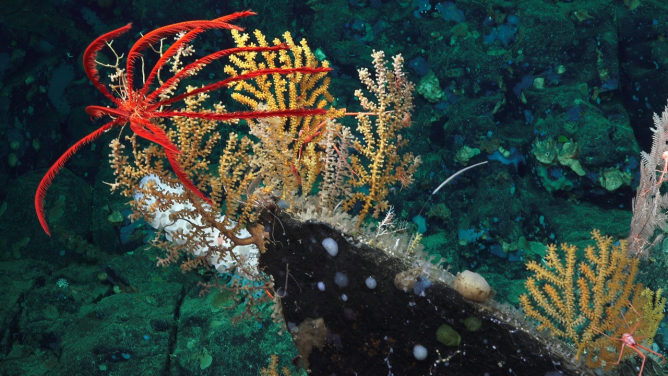The deep sea is one of the least well-known areas on Earth, comprising multiple vulnerable ecosystems that play critical roles in the carbon cycle. However, the deep sea is directly exposed to the effects of human-induced climate change and may now face additional challenges arising from efforts to counteract climate change artificially. These efforts have evolved into geoengineering solutions that could operate on vast spatial scales.
Ocean-based climate interventions (OBCIs) are increasingly claimed as promising solutions to mitigate climate change. These interventions use different technologies to remove carbon dioxide (CO2) from the atmosphere and sequester the carbon in the deep sea, manage solar radiation, or produce renewable energy. However, little is known about the impacts of OBCI technologies on ocean biogeochemistry and the biodiversity of ocean ecosystems. This is true in particular for deep-sea ecosystems, which cover over 40% of the Earth and contain highly vulnerable species and ecosystems.
An international team of experts convened remotely as part of the Deep Ocean Stewardship Initiative's Climate Working Group to consider the deep-sea impacts of OBCI. A research team led by Dr Lisa LEVIN from the Scripps Institution of Oceanography, UC San Diego, including Dr Moriaki YASUHARA from the School of Biological Sciences and The Swire Institute of Marine Science, The University of Hong Kong (HKU), has analysed the proposed approaches to assess their potential impacts on deep-sea ecosystems and biodiversity. Their findings were recently reported in the scientific journal Science raise substantial concern on the potential impacts of these technologies on deep-sea ecosystems and call for the need for an integrated research effort to carefully assess the cost and benefits of each intervention.
The research findings highlight the potential impacts of OBCIs on deep-sea ecosystems. Several lines of evidence led experts to raise substantial concern and call for the need for an integrated research framework to consider deep-sea impacts carefully in mitigation planning.
Balancing hope and risk
While the growing interest in OBCIs as potential tools to mitigate the impacts may provide some hope for a sustainable future, the potential environmental impacts and effectiveness at full-scale have not been evaluated sufficiently. Additionally, governance of OBCI activities is also in the early stages, posing risks to deep-sea biodiversity and ecosystems.
For example, one such intervention is direct CO2 injection into the deep sea, which could sequester large amounts of carbon dioxide from the atmosphere and reduce the overall concentration of greenhouse gases. However, while direct CO2 injection holds promise as a climate intervention, it also carries significant risks. One potential risk is the development of hypercapnia, a condition that occurs when the concentration of carbon dioxide in the water exceeds certain thresholds, which can have negative impacts on marine life and ecosystems. Other carbon sequestration technologies such as ocean fertilisation (enhancing phytoplankton production in the surface ocean and resulting their deposition on the deep ocean floor) and crop waste deposition (deep-sea disposal of terrestrial crop waste), the ideas putting carbon as phytoplankton or terrestrial plant bodies into deep-sea, could also change the food and oxygen availability for deep-sea life.
The deep sea is facing unprecedented threats due to the impact of industrial fisheries, pollution, warming, deoxygenation, acidification and other climate-change-related problems. OBCIs could add further pressure and threaten the functioning of these systems, which are essential for the entire planet.
The lead author Lisa Levin says, 'I see open ocean-based climate intervention as a rapidly emerging arena that poses significant challenges for deep-ocean ecosystems, and thus demands new science and governance before we commit to action.'
'Especially given the vastness, vulnerability, comparatively pristine nature, and poor scientific understanding of the deep-sea ecosystem, we should be careful to green-light these activities that could have irreversible impacts.' Moriaki Yasuhara continues.
The interventions in the marine environment may be irreversible, and more research is needed to assess their impact. Prior to deploying geo-engineered solutions on a large-scale, we should at least understand what those pressures will be, and, by consequence, what the deep-sea may look like in the future.
The journal paper can be addressed here: https://www.science.org/doi/10.1126/science.ade7521
Images download and captions: https://www.scifac.hku.hk/press







